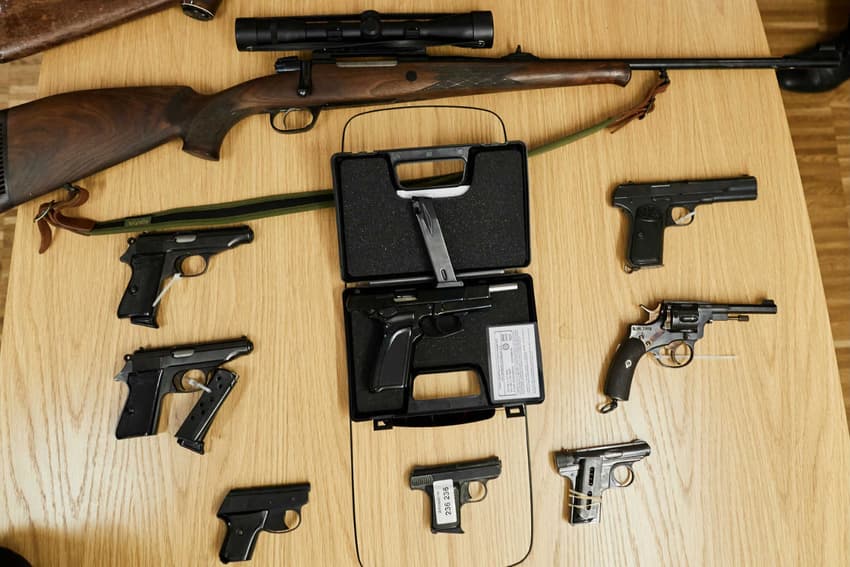12,000 weapons were handed in during Swedish amnesty: police

A weapons amnesty has resulted in 12,000 weapons being voluntarily given up, according to Swedish police figures.
Hunting weapons constituted the largest proportion of the weapons given in to police during the amnesty period between February 1st and April 30th, while over 3,500 handguns were also submitted, according to the police website.
28 tonnes of ammunition were also handed in, police further confirmed.
A lower figure of 9,000 weapons had been reported around the time the amnesty ended in April.
But the 12,000 figure was confirmed via the statement on the police website, with project leader Joakim Norenhag declaring himself "satisfied" with the outcome.
“To have received so many weapons we were not previously aware of is naturally positive. But we should be very careful about saying this will have any impact on the shootings we have seen around the country,” Norenhag told TT.
READ ALSO: In figures: 2017's shootings in Sweden
The South (Syd) police region topped the list of areas with the highest number of relinquished weapons. Around 15,000 weapons were collected during a similar amnesty in 2013.
This year’s amnesty, which was authorised by parliament, ran for three months from February 1st to April 30th. The amnesty allowed people in possession of unregistered or illegal weapons and ammunition to hand them in to police without facing legal pursuit.
Weapons handed in under the terms of the amnesty had to be given up voluntarily.
Persons leaving weapons with police were able to do so anonymously, while police did not have the right to carry out inquiries related to any of the submitted weapons.
In cases where the weapons have registered owners, the owners are informed by police, after which they have a month to collect their property.
Unclaimed and other weapons will eventually be scrapped or handed over to museums should they be rare or of interest.
The amnesty was valid for weapons and ammunition but not for explosives or explosive materials.
READ ALSO: Swedish police hope amnesty can get more than 10,000 weapons off the streets
Comments
See Also
Hunting weapons constituted the largest proportion of the weapons given in to police during the amnesty period between February 1st and April 30th, while over 3,500 handguns were also submitted, according to the police website.
28 tonnes of ammunition were also handed in, police further confirmed.
A lower figure of 9,000 weapons had been reported around the time the amnesty ended in April.
But the 12,000 figure was confirmed via the statement on the police website, with project leader Joakim Norenhag declaring himself "satisfied" with the outcome.
“To have received so many weapons we were not previously aware of is naturally positive. But we should be very careful about saying this will have any impact on the shootings we have seen around the country,” Norenhag told TT.
READ ALSO: In figures: 2017's shootings in Sweden
The South (Syd) police region topped the list of areas with the highest number of relinquished weapons. Around 15,000 weapons were collected during a similar amnesty in 2013.
This year’s amnesty, which was authorised by parliament, ran for three months from February 1st to April 30th. The amnesty allowed people in possession of unregistered or illegal weapons and ammunition to hand them in to police without facing legal pursuit.
Weapons handed in under the terms of the amnesty had to be given up voluntarily.
Persons leaving weapons with police were able to do so anonymously, while police did not have the right to carry out inquiries related to any of the submitted weapons.
In cases where the weapons have registered owners, the owners are informed by police, after which they have a month to collect their property.
Unclaimed and other weapons will eventually be scrapped or handed over to museums should they be rare or of interest.
The amnesty was valid for weapons and ammunition but not for explosives or explosive materials.
READ ALSO: Swedish police hope amnesty can get more than 10,000 weapons off the streets
Join the conversation in our comments section below. Share your own views and experience and if you have a question or suggestion for our journalists then email us at [email protected].
Please keep comments civil, constructive and on topic – and make sure to read our terms of use before getting involved.
Please log in here to leave a comment.